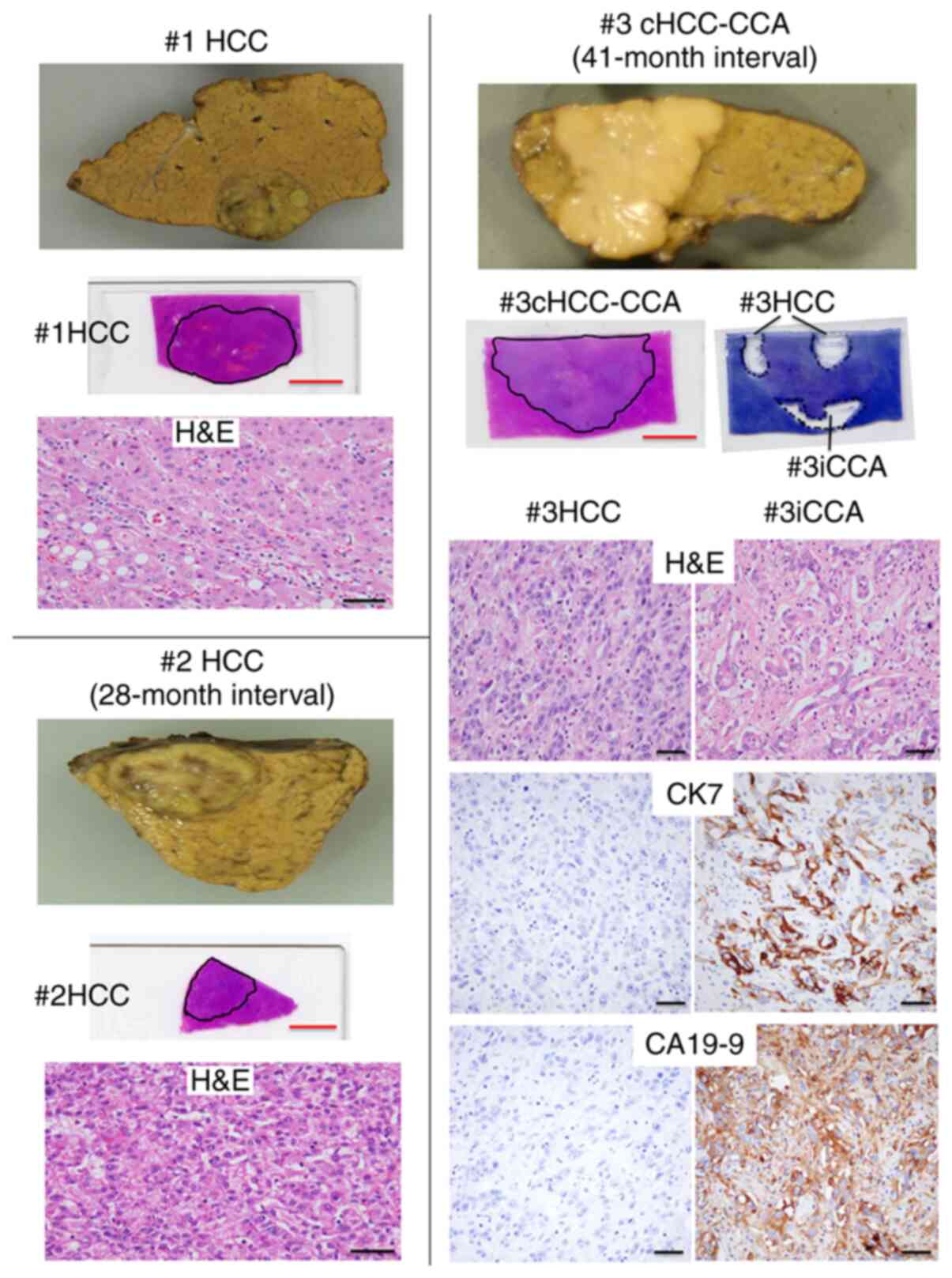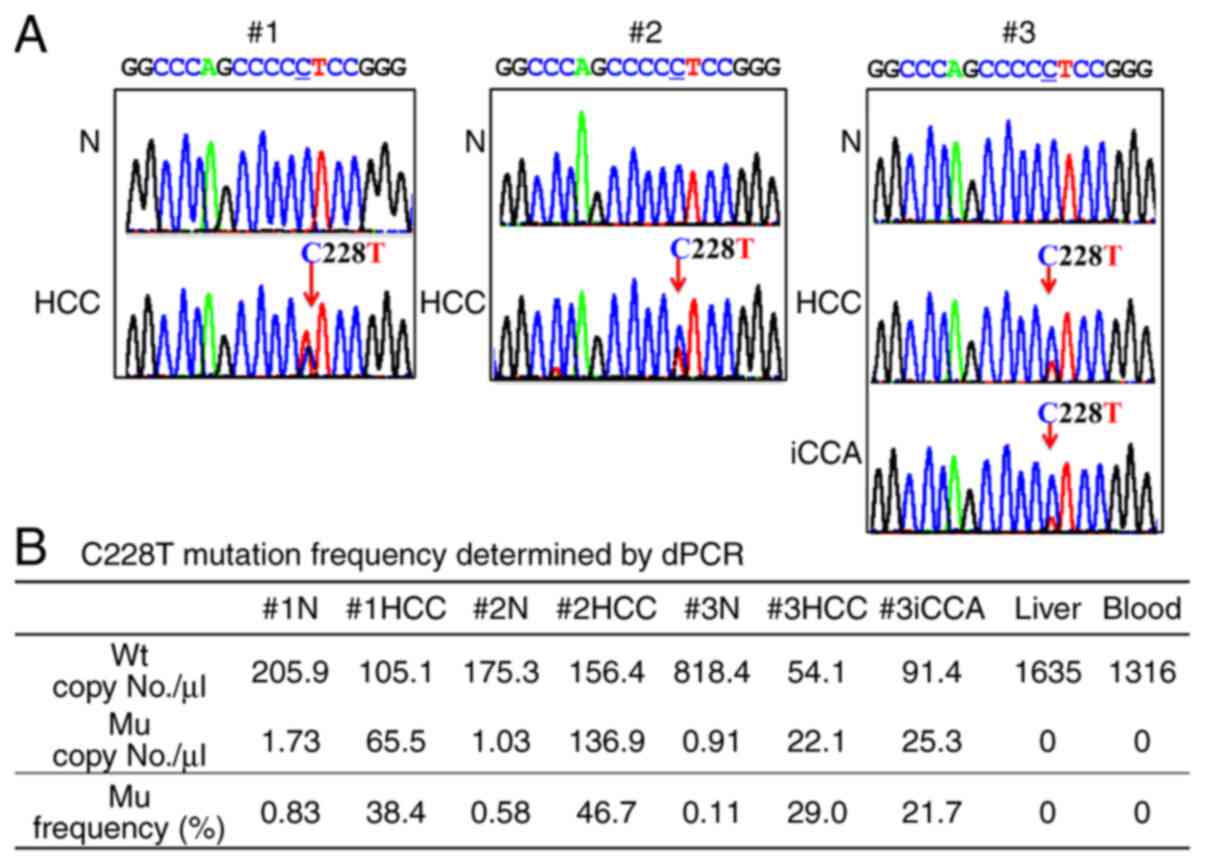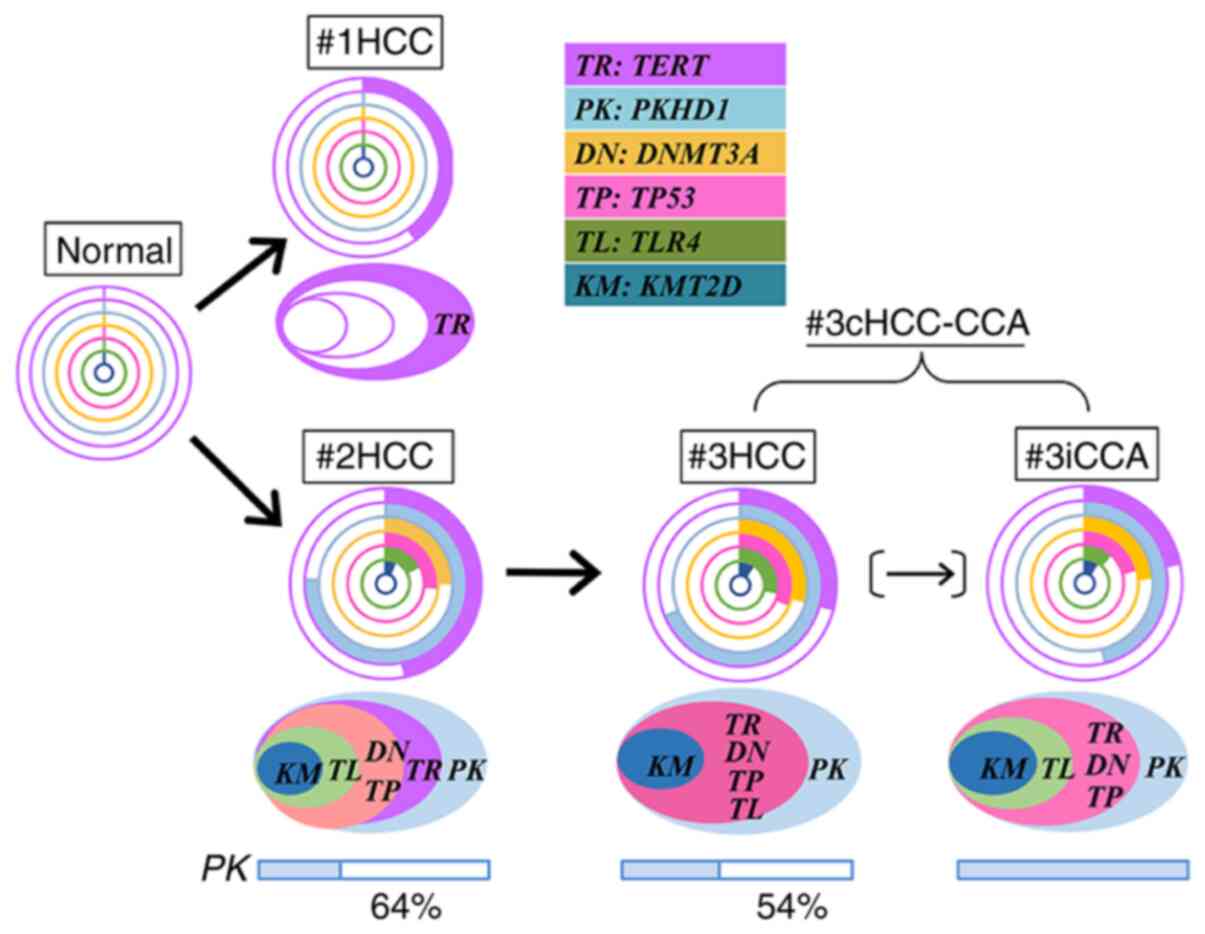|
1
|
Forner A, Llovet JM and Bruix J:
Hepatocellular carcinoma. Lancet. 379:1245–1255. 2012. View Article : Google Scholar : PubMed/NCBI
|
|
2
|
Vilarinho S and Calvisi DF: New advances
in precision medicine for hepatocellular carcinoma recurrence
prediction and treatment. Hepatology. 60:1812–1814. 2014.
View Article : Google Scholar : PubMed/NCBI
|
|
3
|
Feo F and Pascale RM: Multifocal
hepatocellular carcinoma: Intrahepatic metastasis or multicentric
carcinogenesis? Ann Transl Med. 3:42015.PubMed/NCBI
|
|
4
|
Yang SL, Luo YY, Chen M, Zhou YP, Lu FR,
Deng DF and Wu YR: A systematic review and meta-analysis comparing
the prognosis of multicentric occurrence and vs. intrahepatic
metastasis in patients with recurrent hepatocellular carcinoma
after hepatectomy. HPB (Oxford). 19:835–842. 2017. View Article : Google Scholar : PubMed/NCBI
|
|
5
|
Furuta M, Ueno M, Fujimoto A, Hayami S,
Yasukawa S, Kojima F, Arihiro K, Kawakami Y, Wardell CP, Shiraishi
Y, et al: Whole genome sequencing discriminates hepatocellular
carcinoma with intrahepatic metastasis from multi-centric tumors. J
Hepatol. 66:363–373. 2017. View Article : Google Scholar : PubMed/NCBI
|
|
6
|
Sempoux C, Kakar S, Kondo F and
Schirmacher P: Combined hepatocellular-cholangiocarcinoma and
undifferentiated primary liver carcinoma. WHO classification of
tumours of the digestive system. Bosman FT, Garneiro F, Hruban RH
and Theise ND: IARC; Lyon: pp. 260–262. 2019
|
|
7
|
Nagahama Y, Sone M, Chen X, Okada Y,
Yamamoto M, Xin B, Matsuo Y, Komatsu M, Suzuki A, Enomoto K and
Nishikawa Y: Contributions of hepatocytes and bile ductular cells
in ductular reactions and remodeling of the biliary system after
chronic liver injury. Am J Pathol. 184:3001–3012. 2014. View Article : Google Scholar : PubMed/NCBI
|
|
8
|
Sia D, Villanueva A, Friedman SL and
Llovet JM: Liver cancer cell of origin, molecular class, and
effects on patient prognosis. Gastroenterology. 152:745–761. 2017.
View Article : Google Scholar : PubMed/NCBI
|
|
9
|
Chiba T, Zheng YW, Kita K, Yokosuka O,
Saisho H, Onodera M, Miyoshi H, Nakano M, Zen Y, Nakanuma Y, et al:
Enhanced self-renewal capability in hepatic stem/progenitor cells
drives cancer initiation. Gastroenterology. 133:937–950. 2007.
View Article : Google Scholar : PubMed/NCBI
|
|
10
|
Fujimoto A, Furuta M, Totoki Y, Tsunoda T,
Kato M, Shiraishi Y, Tanaka H, Taniguchi H, Kawakami Y, Ueno M, et
al: Whole-genome mutational landscape and characterization of
noncoding and structural mutations in liver cancer. Nat Genet.
48:500–509. 2016. View
Article : Google Scholar : PubMed/NCBI
|
|
11
|
Wang A, Wu L, Lin J, Han L, Bian J, Wu Y,
Robson SC, Xue L, Ge Y, Sang X, et al: Whole-exome sequencing
reveals the origin and evolution of hepato-cholangiocarcinoma. Nat
Commun. 9:8942018. View Article : Google Scholar : PubMed/NCBI
|
|
12
|
Nakayama Y, Yamaguchi H, Einaga N and
Esumi M: Pitfalls of DNA quantification using DNA-binding
fluorescent dyes and suggested solutions. PLoS One.
11:e01505282016. View Article : Google Scholar : PubMed/NCBI
|
|
13
|
Einaga N, Yoshida A, Noda H, Suemitsu M,
Nakayama Y, Sakurada A, Kawaji Y, Yamaguchi H, Sasaki Y, Tokino T
and Esumi M: Assessment of the quality of DNA from various
formalin-fixed paraffin-embedded (FFPE) tissues and the use of this
DNA for next-generation sequencing (NGS) with no artifactual
mutation. PLoS One. 12:e01762802017. View Article : Google Scholar : PubMed/NCBI
|
|
14
|
Ward JH Jr: Hierarchical grouping to
optimize an objective function. J Am Stat Assoc. 58:236–244. 1963.
View Article : Google Scholar
|
|
15
|
Edmondson HA and Steiner PE: Primary
carcinoma of the liver: A study of 100 cases among 48,900
necropsies. Cancer. 7:462–503. 1954. View Article : Google Scholar : PubMed/NCBI
|
|
16
|
Nakanuma Y, Klimstra DS, Komuta M and Zen
Y: Intrahepatic cholangiocarcinoma. WHO Classification of Tumours
of the Digestive System. Bosman FT, Carneiro F, Hruban RH and
Theise ND: IARC; Lyon: pp. 254–259. 2019
|
|
17
|
Huang Zy, Liang By, Xiong M, Zhan DQ, Wei
S, Wang GP, Chen YF and Chen XP: Long-term outcomes of repeat
hepatic resection in patients with recurrent hepatocellular
carcinoma and analysis of recurrent types and their prognosis: A
single-center experience in China. Ann Surg Oncol. 19:2515–2525.
2012. View Article : Google Scholar : PubMed/NCBI
|
|
18
|
Gerlinger M, Rowan AJ, Horswell S, Math M,
Larkin J, Endesfelder D, Gronroos E, Martinez P, Matthews N and
Stewart A: Intratumor heterogeneity and branched evolution revealed
by multiregion sequencing. N Engl J Med. 366:883–892. 2012.
View Article : Google Scholar : PubMed/NCBI
|
|
19
|
Gundem G, Van Loo P, Kremeyer B,
Alexandrov LB, Tubio JM, Papaemmanuil E, Brewer DS, Kallio HM,
Högnäs G, Annala M, et al: The evolutionary history of lethal
metastatic prostate cancer. Nature. 520:353–357. 2015. View Article : Google Scholar : PubMed/NCBI
|
|
20
|
Yamamoto S, Midorikawa Y, Nagae G, Tatsuno
K, Ueda H, Moriyama M, Takayama T and Aburatani H: Spatial and
temporal expansion of intrahepatic metastasis by
molecularly-defined clonality in multiple liver cancers. Cancer
Sci. 111:601–609. 2020. View Article : Google Scholar : PubMed/NCBI
|
|
21
|
Joseph NM, Tsokos CG, Umetsu SE, Shain AH,
Kelley RK, Onodera C, Bowman S, Talevich E, Ferrell LD, Kakar S and
Krings G: Genomic profiling of combined
hepatocellular-cholangiocarcinoma reveals similar genetics to
hepatocellular carcinoma. J Pathol. 248:164–178. 2019. View Article : Google Scholar : PubMed/NCBI
|
|
22
|
Xue R, Chen L, Zhang C, Fujita M, Li R,
Yan SM, Ong CK, Liao X, Gao Q, Sasagawa S, et al: Genomic and
transcriptomic profiling of combined hepatocellular and
intrahepatic cholangiocarcinoma reveals distinct molecular
subtypes. Cancer Cell. 35:932–947 e938. 2019. View Article : Google Scholar : PubMed/NCBI
|
|
23
|
Hill MA, Alexander WB, Guo B, Kato Y,
Patra K, O'Dell MR, McCall MN, Whitney-Miller CL, Bardeesy N and
Hezel AF: Kras and Tp53 mutations cause cholangiocyte- and
hepatocyte-derived cholangiocarcinoma. Cancer Res. 78:4445–4451.
2018. View Article : Google Scholar : PubMed/NCBI
|
|
24
|
Seehawer M, Heinzmann F, D'Artista L,
Harbig J, Roux PF, Hoenicke L, Dang H, Klotz S, Robinson L, Doré G,
et al: Necroptosis microenvironment directs lineage commitment in
liver cancer. Nature. 562:69–75. 2018. View Article : Google Scholar : PubMed/NCBI
|
|
25
|
Vinagre J, Almeida A, Populo H, Batista R,
Lyra J, Pinto V, Coelho R, Celestino R, Prazeres H, Lima L, et al:
Frequency of TERT promoter mutations in human cancers. Nat Commun.
4:21852013. View Article : Google Scholar : PubMed/NCBI
|
|
26
|
Nault JC, Mallet M, Pilati C, Calderaro J,
Bioulac-Sage P, Laurent C, Laurent A, Cherqui D, Balabaud C and
Zucman-Rossi J: High frequency of telomerase reverse-transcriptase
promoter somatic mutations in hepatocellular carcinoma and
preneoplastic lesions. Nat Commun. 4:22182013. View Article : Google Scholar : PubMed/NCBI
|
|
27
|
Totoki Y, Tatsuno K, Covington KR, Ueda H,
Creighton CJ, Kato M, Tsuji S, Donehower LA, Slagle BL, Nakamura H,
et al: Trans-ancestry mutational landscape of hepatocellular
carcinoma genomes. Nat Genet. 46:1267–1273. 2014. View Article : Google Scholar : PubMed/NCBI
|
|
28
|
Fujimoto A, Furuta M, Shiraishi Y, Gotoh
K, Kawakami Y, Arihiro K, Nakamura T, Ueno M, Ariizumi SI, Nguyen
HH, et al: Whole-genome mutational landscape of liver cancers
displaying biliary phenotype reveals hepatitis impact and molecular
diversity. Nat Commun. 6:61202015. View Article : Google Scholar : PubMed/NCBI
|
|
29
|
Kim SK, Takeda H, Takai A, Matsumoto T,
Kakiuchi N, Yokoyama A, Yoshida K, Kaido T, Uemoto S, Minamiguchi
S, et al: Comprehensive analysis of genetic aberrations linked to
tumorigenesis in regenerative nodules of liver cirrhosis. J
Gastroenterol. 54:628–640. 2019. View Article : Google Scholar : PubMed/NCBI
|

















